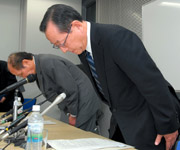One week ago, The Asahi Shimbun reported on the latest development in a 40 year old court case that leaves Japan’s supreme court in the touchy position of having to abjudicate a dispute between The People’s Republic of China and Taiwan/The Republic of China over which government is the proper owner of a decrepit student dormitory located near Kyoto University, know as Kokaryo(光華寮).
For some of the basic facts of the case, here are some quotes from the Asahi article:
Located near Kyoto University in a quiet residential area, the five-story Kokaryo dormitory has a total floor space of about 2,000 square meters. A few students still reside there.
Kyoto University rented out the building from a private company during World War II and used it as a dormitory for Chinese students.
After the end of the war, the Republic of China purchased the dorm and left the students living there to manage it. Taiwan purchased the structure in 1952 to allow it to be used as a dorm for foreign students as before. This came after Mao Tse-tung established the People’s Republic of China in 1949.
In 1967, the Taiwanese government filed a lawsuit in the Kyoto District Court seeking to have students who supported the Chinese Communist Party in Beijing removed from the building.
The situation became even more complicated after 1972, the year Japan and China re-established diplomatic ties. At the same time, Japan broke off diplomatic relations with Taiwan.
In 1977, the Kyoto District Court ruled against Taiwan, but a 1982 Osaka High Court ruling overturned the lower court decision and sent the case back to the district court.
In 1986, the Kyoto District Court ruled in favor of Taiwan, and the Osaka High Court backed that ruling in 1987.
Beijing heatedly protested the court ruling, arguing that it recognized two Chinas in opposition to the official Japanese government stance that Beijing is the sole, legitimate representative of China.
The case then went to the Supreme Court, but for two decades it took no action because of possible diplomatic implications.
On Tuesday, it was learned that the Third Petty Bench of the Supreme Court had sent letters to lawyers for the two sides involved in the lawsuit seeking their opinion on which government held the right to represent China.
The lawsuit was originally filed with Taiwan as the plaintiff. If the Supreme Court eventually rules that China should become the plaintiff as the successor government, Taiwan would have no choice but to allow Beijing to continue with the case.
At one point, the dormitory lawsuit became a major diplomatic issue between Japan and China that was taken up during meetings of leaders of the two nations.
The late Deng Xiaoping criticized the Japanese court rulings supporting Taiwan.
Japanese government officials were forced to seek Beijing’s understanding that under Japan’s constitutional separation of powers, the administrative branch could not interfere with decisions made by the judicial branch.
The Supreme Court’s apparent decision to dust off the case could point to a new focus on legal issues.
Until the second Osaka High Court ruling, the focus had been whether the communist government set up in Beijing should be allowed to assume ownership of overseas assets.
 According to a history of Kyoto University, the Kokaryo was first provided by Kyoto University in May of 1945 for the use of foreign students born in the Republic of China and the South Pacific islands that were in Japan to receive “special education.” Interestingly, it does not say “China”(中国) or “overseas Chinese” (華僑) , but quite specifically “Republic of China.” (中華民国) Of course, this is not an original document showing the intent of the university at the time they first rented the dormitory, but there may be something to it. Certainly there were many Taiwanese students in Japan at the time, but Taiwan was still Japanese and not Republic of China territory. Were there many ROC citizens studying in Japan before the end of WWII? Were there also PRC students at the time? This architecture page says that the building was constructed in 1931, and was originally an apartment building, presumably private, intended for Kyoto University students, and also gives a more detailed location, Sakyo-ku, Kitashirakawa,
According to a history of Kyoto University, the Kokaryo was first provided by Kyoto University in May of 1945 for the use of foreign students born in the Republic of China and the South Pacific islands that were in Japan to receive “special education.” Interestingly, it does not say “China”(中国) or “overseas Chinese” (華僑) , but quite specifically “Republic of China.” (中華民国) Of course, this is not an original document showing the intent of the university at the time they first rented the dormitory, but there may be something to it. Certainly there were many Taiwanese students in Japan at the time, but Taiwan was still Japanese and not Republic of China territory. Were there many ROC citizens studying in Japan before the end of WWII? Were there also PRC students at the time? This architecture page says that the building was constructed in 1931, and was originally an apartment building, presumably private, intended for Kyoto University students, and also gives a more detailed location, Sakyo-ku, Kitashirakawa,
According to this Yomiuri story, the legal battle started when Taiwan attempted to evict 8 students due to “trouble related to the management of the dormitory,” who then filed a lawsuit protesting the eviction, but the reason that Taiwan actually decided to throw out the students at this time is not indicated in any Japanese or English language articles that I found. However, according an article I found in the Liberty Times, (a Taiwanese newspaper well known for its pro-independence stance) the Chinese students were originally kicked out of the dorm in response to complaints by dorm-resident Taiwanese students, who were annoyed by shouts of “Banzai Chairman Mao!” from Chinese students in the grip of Cultural Revolution fever.
The PRC consulate in Fukuoka web page has a page outlining the official PRC government version of the story. Interestingly, this appears to be a direct translation of a Chinese page that I had originally read on the website of CCTV, where it is part of a September 2002 special on “30 Years of Normalized China-Japan Relations.”Aside from giving me a handy way to check how well I understood the Chinese page (I would say I got a passing grade, but not an A), the fact that a consulate general web page has exactly the same text as CCTV (China Central Television) is a strong reminder that CCTV is in fact an official government mouthpiece, and not a government sponsored but editorially independent media organization, like the BBC or NHK are supposed to be.
At least one possibly critical detail was left out of all Japanese and Taiwanese reporting on the case that I found, but can be found in Chinese language articles PRC side, as well as the aforementioned Japanese text of the Chinese consulate web site. Since the basis of the conflict is over which government has rights to overseas property of China, but since Kokaryo was not actually purchased by the ROC government until AFTER they had fled to Taiwan and the People’s Republic had been officially established, why is it even under contention? That is, the PRC is contending that overseas property owned by China before the PRC officially became China’s successor state should be transferred to their control. OK, fine- even if you accept that argument, why should they gain control of something that was purchased by the de-facto independent government on Taiwan? (Note that China does not seem to be attempting to harm Taiwanese property rights in general, perhaps because that would be too threatening to the massive Taiwanese investment in China.) The answer seems to be, at least according to China, because the Kokaryo was purchased by Taiwan’s representative in Japan using money received from the sale of property that had been seized by the Japan military’s invasion of China during WW2. I don’t have enough information to be entirely clear, but this seems to imply that while Taiwan may have the rights to property held or controlled by Taiwan before the establishment of the PRC, since the resources used to purchase Kokaryo were originally stolen from China, they must also be returned to China, which the ROC government on Taiwan was longer the legal representative of at that time. I have not yet found a second, independent, source for this information, or in fact for the Taiwanese account of the Chinese students’ eviction. Interestingly, and unsurprisingly, there are essential facts reported by the media of both sides that are not reported by anyone else, making it very difficult to uncover the reality without doing a significant amount of independent research.
Expect translations (more like paraphrase in the case of Chinese sources) of articles from both the Chinese and Taiwanese perspective.



 According to
According to 

